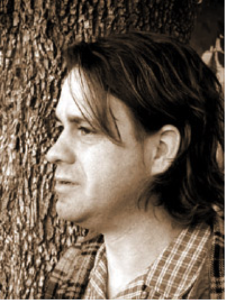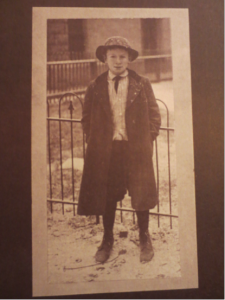From CutBank 77
Ghosts
Someday I’ll be like a prehistoric painter with a crooked finger
who left handprints on a rock face; remembered for making
a handicap into symbolism, threatened by oblivion every time
someone exhales. This is why I’d rather leave you breathless
than engage in conversation. This is how a spirit rattles chains.
Old gods challenged the imagination, visiting Earth like swans,
or else arriving like crepuscular rays, knowing dusk and dawn
to be the truest times of day. Lucretius believed all things
mattered, that even the least significant ideas were made up
of atoms. Great Caesar’s Ghost was just a film he sloughed off
like dry skin. All your recollections belong to someone else.
We know cicadas molt before they get their wings, leaving
flightless memories clinging to the trees. Lobsters must
feel the urge to come out of their shells. Maybe this is like
our need to be re-born. Maybe this is why we say we’re new
every seven years. But what is it with our interest in scars?
What about the impulse to apologize for what we can’t erase?
Captain Cook spied the sun through a state-of-the-art glass
and never discovered the secrets of Venus. But then, his sailors
returned from Polynesia with tattoos. Is it love, or the lack,
that makes us mark each other? Aeneas bore his father’s weight
in front of every conquering Greek. A microscope confirms
the wolf in every Border collie’s DNA. There’s a Trojan Horse
for you. There’s a little chimp in every Borderline personality.
Sometimes we channel our ancestors in the dining room
and wind up like F. Scott Fitzgerald in the garden eating dirt.
An Aborigine touching up ancient art will tell you spirits move
his hand. Like once I spoke to a man who said he was my dad
on a Ouija board. Once I read Paul’s letter to the Ephesians
under the influence of psilocybin. Some ghosts are better left
unread. Other ghosts are shadows of the most horrific things,
like the girl who survived My Lai pretending to be a corpse.
We can imagine so many angry ghosts. Maybe that’s why
Epicurus wanted us to believe death was the end of our days.
Maybe that’s why Yeats used his wife like a rotary phone
when he spoke with the dead. He imagined himself in death
as a mechanical bird. His readers would be voices speaking
his disembodied words. At dawn, I can’t tell the difference
between horizon and the sea. Lucretius understood the ocean
rose to fill clouds with rain. It always rains in Gothic novels.
English ghosts pass through the wainscoting. All the ghosts
are haunting future ghosts. Farm hands who listened to voices
telling them they’d be better off if they bought the farm
are buried in the cemetery with the rest. If you drive at night
you might catch a glimpse. There’s a difference between
windrows and the woods. There’s a vine wrapping the wrought
iron fence. If you appreciate someone’s work, Lucretius said,
it really is a part of them that’s gone to your head.
-----------------------------------------
John Wesley Horton (aka Johnny Horton) spends many summers teaching creative writing in Rome, Italy for the University of Washington. A New Englander by birth, he grew up in the Midwest and now lives and works in Seattle. He’s recently published poems in Poetry Northwest, Borderlands, Notre Dame Review, Alive at the Center, andCity of the Big Shoulders: An Anthology of Chicago Poetry (U. of Iowa).
















